Brief
Jul 11 2023
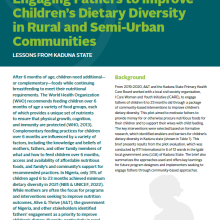
Engaging Fathers to Improve Children's Dietary Diversity in Rural and Semi-Urban Communities: Lessons from Kaduna State
From 2019-2020, A&T and the Kaduna State Primary Health Care Board worked with a local civil society organization, I Care Women and Youth Initiative (ICARE), to engage fathers of children 6 to 23 months old through a package of community-based interventions to improve children’s dietary diver
Brief
May 29 2023
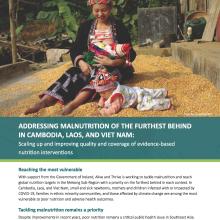
Addressing malnutrition of the furthest behind in Cambodia, Laos, and Viet Nam
With support from the Government of Ireland, Alive & Thrive is working to tackle malnutrition and reach global nutrition targets in the Mekong Sub-Region with a priority on the furthest behind in each context.
Brief
Oct 23 2018

Nigeria nutrition profiles
Nigeria has recently made progress toward strengthening policies and programs in support of maternal, infant and young child nutrition (MIYCN). However, progress has been limited to specific states—and creating strong plans for implementation of new policies remains a challenge.
Brief
Oct 01 2018
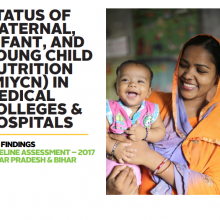
Status of maternal, infant, and young child nutrition (MIYCN) in medical colleges and hospitals: Baseline assessment (2017) in Uttar Pradesh and Bihar
Despite a favorable policy environment for maternal, infant, and young child nutrition (MIYCN), frontline delivery of critical MIYCN interventions has been a sustained challenge in India’s public health nutrition programs.
Brief
Jan 01 2018
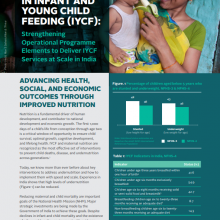
What works in infant and young child feeding (IYCF): Strengthening operational program elements to deliver IYCF at scale in India
The brief highlights key factors to scale up IYCF with impact based on a review of lessons learned from the A&T initiative and other successful global nutrition programs.
Brief
Oct 15 2017
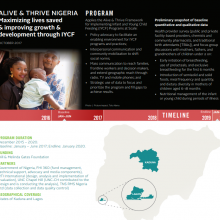
Maximizing lives saved & improving growth & development through IYCF in Nigeria
This information card shares a preliminary snapshot of quantitative and qualitative data from a health provider survey (public and private facility-based providers, chemists and community pharmacists, and traditional birth attendants), and focus group discussions with mothers, fathers, and grandm

